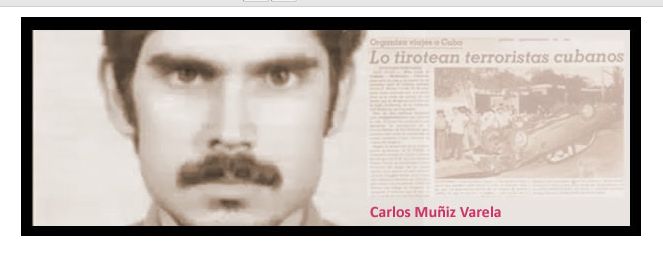
Carlos: A ‘belated execution?’
By Mayra Montero
SAN JUAN, Puerto Rico – At the La Tertulia bookstore on Aug. 10, I attended a singular event: a celebration of the 60th birthday of Carlos Muñiz Varela, who was gunned down in 1979 at the age of 26.

Muñiz Varela had opened in San Juan the first travel agency that would make it easier for Cubans in Puerto Rico to visit their relatives in Cuba. That’s why he was killed; he was neither a spy nor owed anything to anyone nor distributed cocaine. He had founded a legal business to facilitate travel to Cuba, that was all.
Two basic elements merged in his assassination: an ultra-rightist movement of Cuban origin, with a violent bent that had been demonstrated in other attacks and the downing of airplanes, and a police force that was dominated by Mafia elements and death squads.
The Puerto Rico Police Department [PPR] never fully recovered from that voyage on the twisted edge of the abyss. What we have seen in recent years has not occurred by chance or through spontaneous combustion. The rotten muck of corruption and organized crime percolated through the base of that institution and it has taken – and will take – divine intervention to eradicate it.
All that is needed is the right conditions, a slightly intolerant government or a repressive legislature for the old defects to revive and push the PPR down abusive paths.
The latest in the case of Muñiz Varela was the request made by the office of Tony West in the U.S. Department of Justice to the Secretary of Justice of Puerto Rico, Luis Sánchez Betances, for the petitions of declassification that the family has filed. That happened only a few days ago and it’s quite an event. For the first time in 35 years, there is direct contact between two agencies on the subject of Muñiz Varela’s assassination.
Back to my original topic. During the event at La Tertulia, the documentary “Remembering Carlos” was shown. In the audience were relatives and friends of Muñiz Varela. Thirty-four years after the crime, his mother watched the documentary for the second or third time. It tells everything: who plotted, where they met, how they attacked Carlos in a most savage manner on a street of a housing complex, as adults strolled and children played nearby.
The narration replays a fragment from an interview made by Luis Francisco Ojeda to Julio Labatut, the eternal suspect. When Ojeda refers to Muñiz Varela’s assassination, Labatut interrupts him.
“It wasn’t an assassination,” Labatut says. “It was a belated execution. And I say belated because he was killed at age 26. He should have been killed at birth.”
He dared to say that in front of the camera, the technicians and the entire audience. The worst part was not that he said it, but that, after he said it, he was welcomed with great fanfare every time he appeared on that gossip program, which is no longer on the air.
In all the years that Labatut sent floral bouquets to the TV station because that program stayed at the top of the rankings, I never saw anyone initiating a boycott or a demand to the station owner to return the flowers sent by that vile individual.
For years, Labatut visited the set of the famous program and was welcomed with affection, even admiration. To boot, the station asked him for flowers for other programs. That was immoral and few of us spoke up to complain.
Because of that condescendence and the close ties, the former Speaker of the [Puerto Rican] House of Representatives, Jennifer González, decided to organize an homage to Labatut. She can never plead ignorance. I know for a fact that she received evidence of the man’s dark activities and the strange way in which he hastened to pay Alejo Maldonado’s bail in 1982. She also received a complete recording of Ojeda’s program.
Even so, the House honored him. The Legislature was in bad shape, with many representatives who were conniving and corrupt, but the homage was an indignity from which the House has not recovered. All those fools, holed up like rats, applauding and praising a man who gave excuses for his crime.
I don’t give a hoot if a TV program deals with adultery or masturbation. After all, they all talk about the same, with more or less foolishness, but has anything changed? Because every so often I detect a homophobic or racist dig.
What happens is that, when the boycott won, an important weapon was used up, and it will be difficult to organize another. Isn’t the program of the “closed cases,” which is shown even in doctors’ waiting rooms, undignified because of the way it treats human beings and deals with mankind’s terrible and painful issues?
I repeat that I don’t care a hoot for the scandals in the world of entertainment. What was important to me – and hurt me – was that Channel 4 and the gossip program allowed an unscrupulous terrorist to blanket them with flowers.
After the documentary ended and the lights went back on at La Tertulia, Muñiz Varela’s mother dried her tears with a small kerchief. She had just heard the intellectual author of her son’s murder declare that it had been “a belated execution because he should have been killed at birth.”
I don’t know if she remembered the homage on the day the Capitol filled with dung. I do.
Mayra Montero is a Cuban writer who lives in Puerto Rico.
(From the Puerto Rican newspaper El Nuevo Día)

